Effective Communication Types in Childcare to Boost Parent Involvement
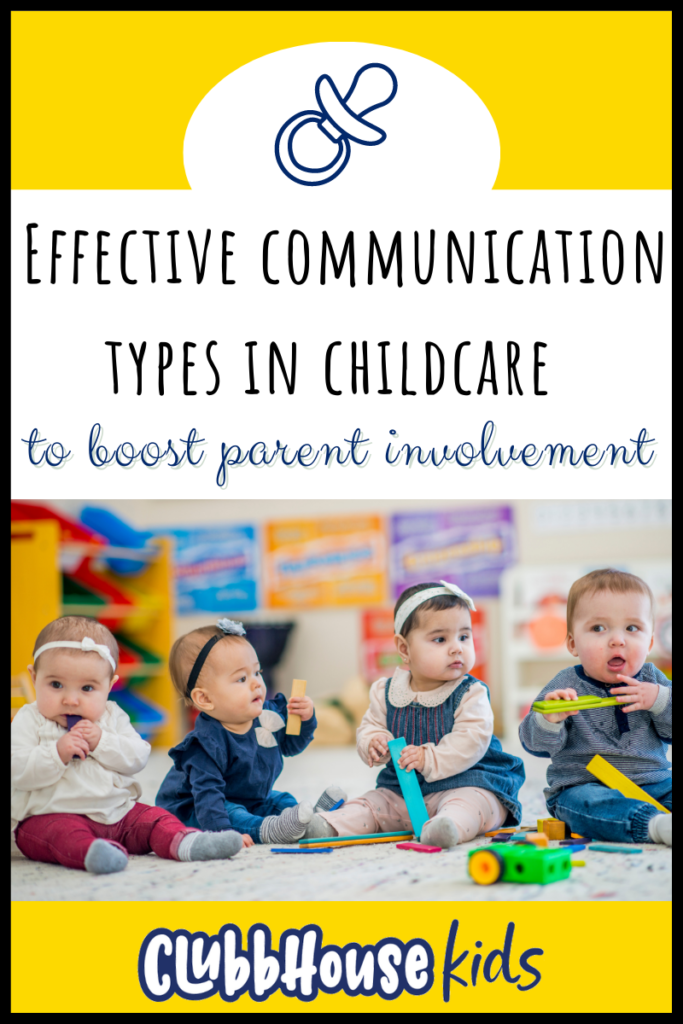
Hey provider! Do you struggle with parent communication? This blog post will cover how I use effective communication types to boost my parent engagement and keep communication open in my home daycare. Keep scrolling this blog post contains a lot of printable freebies that will boost parent involvement in your daycare!
Toddler Curriculum
I am so glad you stopped by today. If I haven’t introduced myself, my name is Hollie, and I love helping other daycare providers, early education teachers, and mamas with ideas to create engaging activities for the little ones in their life. Out of a need to have a toddler curriculum that would work for multiple ages and be appropriate for infants and toddlers, I created ClubbhouseKids Curriculum. Want to know more? Join my email list to receive exclusive content I create just for this group. You can also follow my TPT store and browse all my toddler curriculum created just for early learning providers. Now let’s get into the communication types in childcare.
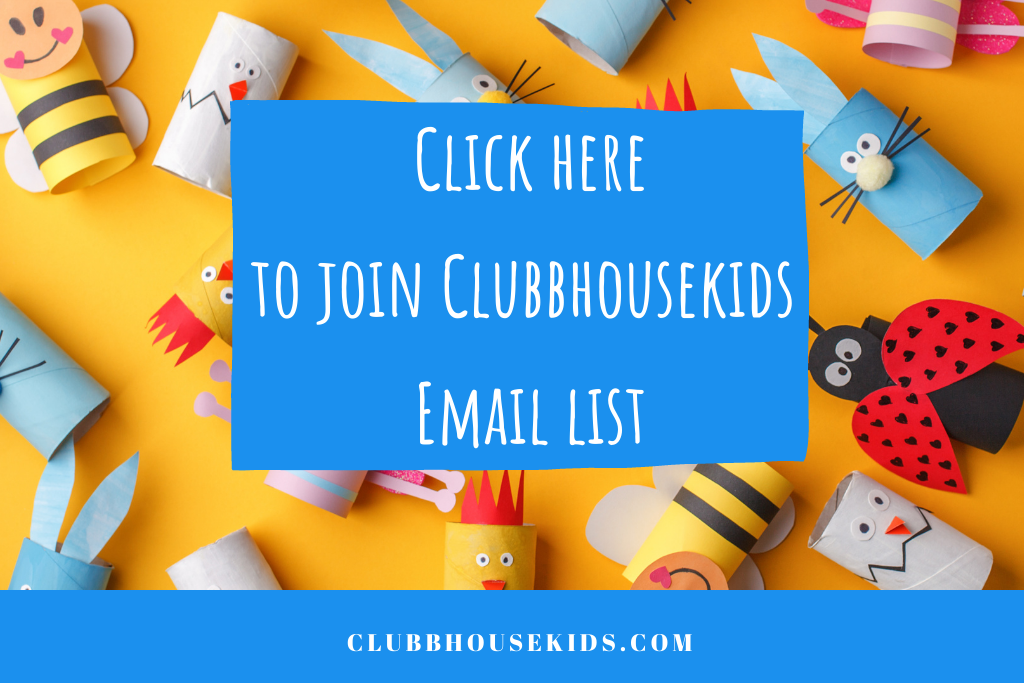
Parent Communication
“What is parent communication?” The definition of communication is sending information from one person to another. When childcare providers have clear communication with their daycare families, the clients will be more engaged and involved in the program. Parent communication also allows the childcare provider to get a better picture of a child’s home environment and most importantly parent communication shows respect.
When a childcare provider has open communication with their clients, it shows they value their insights. Parents will feel more satisfied with their child’s care and providers will feel more competent. Using effective communication types ultimately helps you care for the needs of each child in your program. So let us get into the different ways I use parent communication in my program!
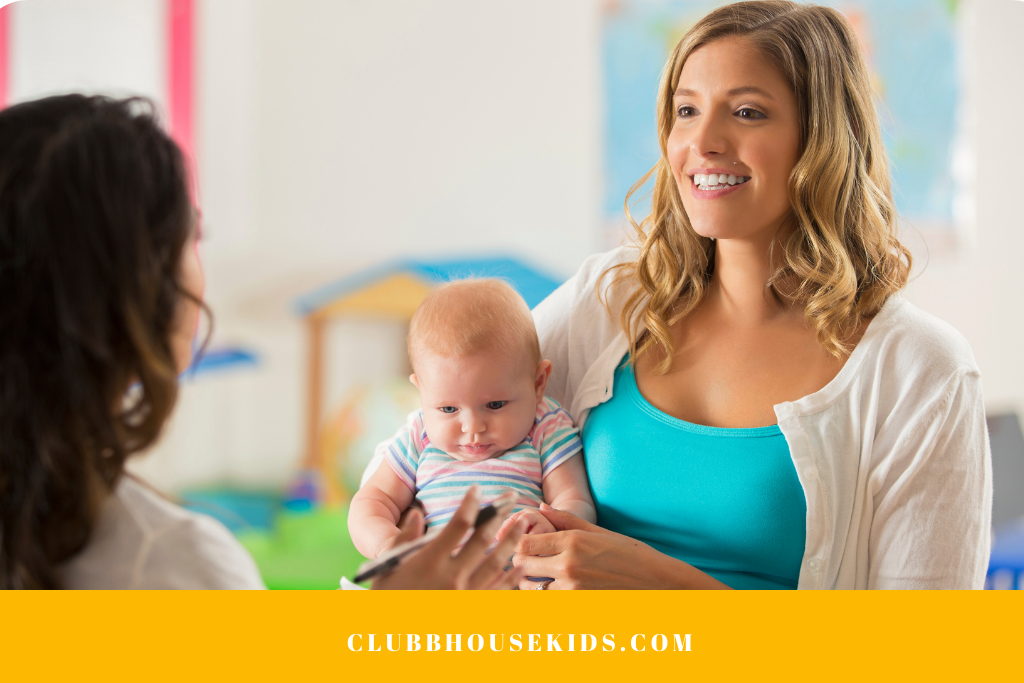
Build Positive Relationships
Wear A Smile
The most important way to build parent communication is to build positive relationships with each one of your daycare families. I know we can get pretty burned out by the end of the day. As much as I love my job, I love closing time also. Don’t let the exhaustion of the day send the wrong message to your daycare families. I always make an extra effort to wear a smile during pickups and drop-offs. A positive attitude can go a long way in making a parent feel comfortable in your home.
Little Kindness Goes A Long Way
A little kindness goes a long way. Show genuine compassion and kindness for each child in your program. When a parent comes to you with a concern, listen intently. If you don’t know how to respond, say you will give it some thought and get back to them. Parents are trusting us with their most valuable treasure, kindness can help build a positive relationship and help them to feel comfortable.
Compliment Sandwich
Have you heard of the compliment sandwich? Having to tell a parent a behavior issue is going on in your classroom concerning their child is no fun! You can ease this parent communication by starting the conversation with a positive about the child and then inform them what you are seeing, ask them how they manage that behavior at home, and end with another compliment.
Communication Notebook
I like to keep a notebook by my arrival and dismissal area. During these times a parent might mention something that is very important in caring for their child. Such as they have diaper rash. They also might tell me something going on in their family, a fun event or concern. After they leave I quickly jot it down in my communication notebook.
Right before arrival or dismissal, I can scroll my notes in my communication notebook and be ready for quick conversations with each daycare family. It can be as small as asking them how their cousin’s birthday party went to a larger concern they are having that you would like to address. This communication type helps everyone feel heard in your program, and will only benefit the child.
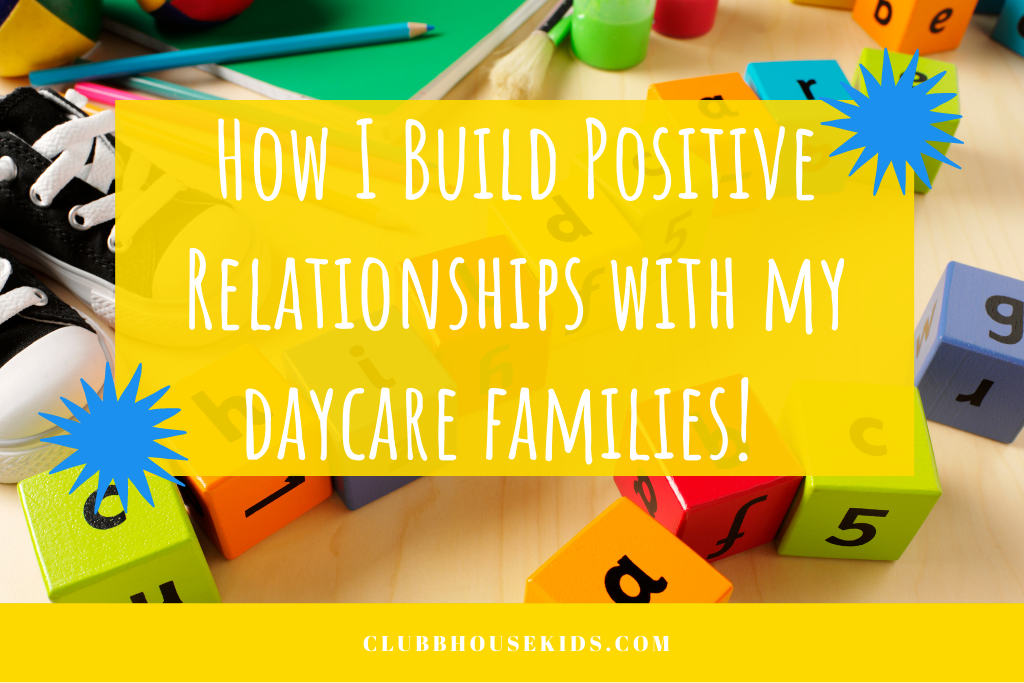
Daycare Daily Reports
One of the easiest communication types in childcare is through daycare daily reports. Daycare Daily reports are often used in a childcare setting as a way to connect with families by sharing what their child’s day looked like while they were in care.
Daycare take-home sheets often include details on the child’s meals, potty, diapers, nap times, and learning activities. Providers can also include personal notes to each parent and also let them know what supplies are needed or are getting low. Daycare Daily Reports helps parents know their child’s needs are being met and they are getting the care they deserve.
Infant Daily Report
These are my infant daily reports. Infant daily reports tell parents how their baby slept, diaper changes, and eating habits while in the daycare providers’ care. Infant daily reports will also have a place to write any supplies that are getting low or an item you wish to be brought to daycare.
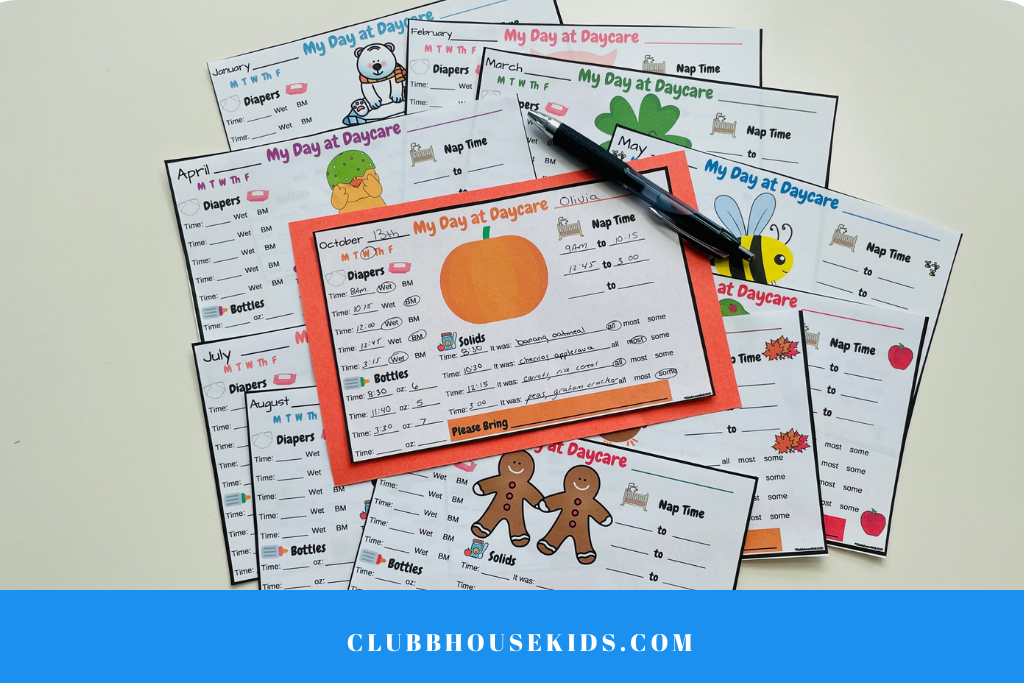
Toddler Daily Report
Once my daycare students graduate from baby foods into more traditional table foods, I like to move them up to toddler daily reports. A Toddler daily report is very similar to an infant daily report but has more space to write in meals and the number of diaper change lines decreases. I still have a spot to write in anything that needed to be brought to care. I also like to use the backside of my toddler daily report to give parents a quick summary of what we did in class that day.
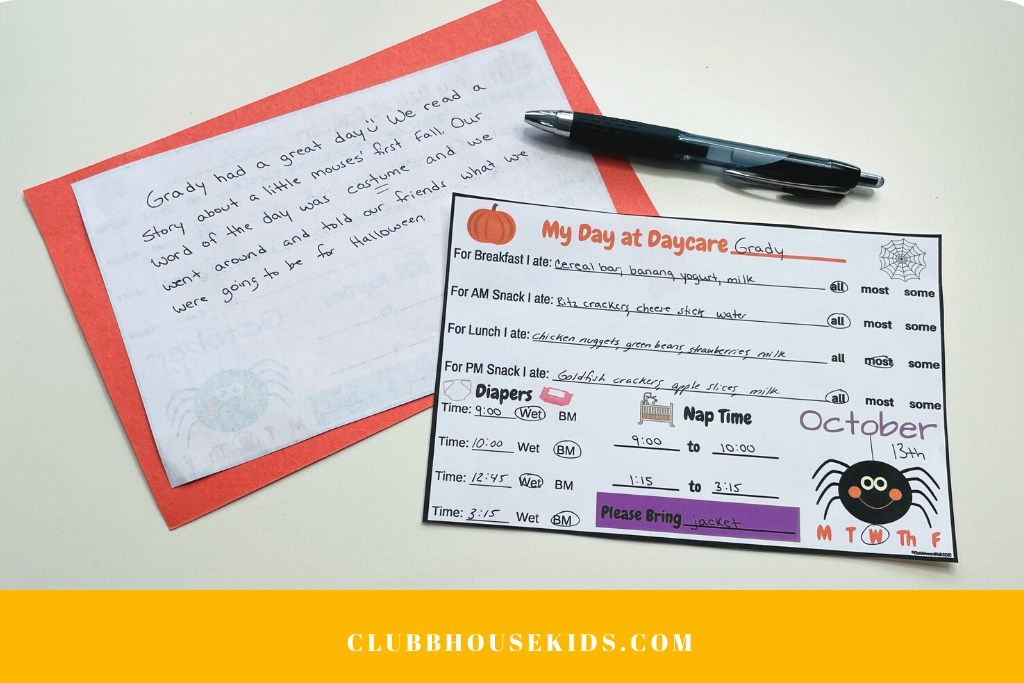
Preschool Daily Report
The last daily report I use in my home daycare is my preschool daily report. I bump my daycare kids to this preschool daily report after they are potty trained. Share your classroom with your student’s parents through the preschool daily report and you will start to see parent communication improve. If you are an introvert like me, filling out these sheets helps you to have something to talk about during pickup time. Parents really appreciate these!
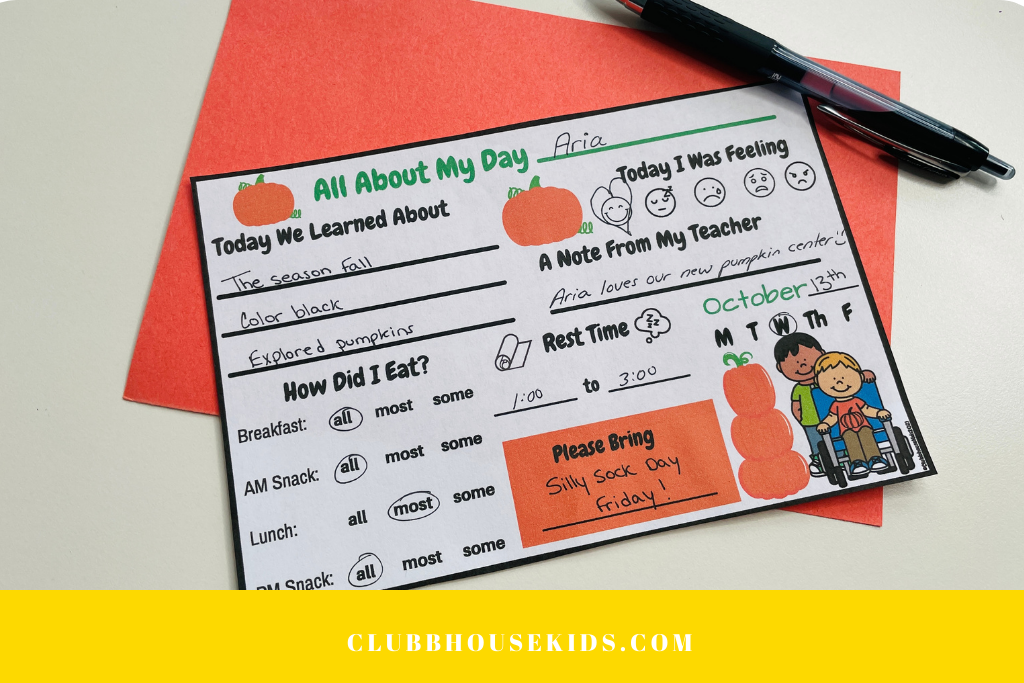
Daycare Sign In Sheet
Do you have your parents sign their child in and out every day? A daycare sign in sheet is a great communication type in childcare. Requiring parents to sign their child in and out of your program, allows you to keep track of arrival and departure times.
Hours of Operation
A daycare sign in and out sheet also helps you get a time range for each child under your supervision. This is very important if you are wanting to adjust your hours of operation. Daycare licensing also requires a record of times children were in your care. A Daycare Sign In Sheet can be all the proof you need to keep your records organized.
Safety
The number one thing we should be concerned about in our programs is safety. In case of an evacuation, I use my daycare sign in sheet as my attendance chart, giving me reassurance that everyone is accounted for.
Meal Counter
Another way to use a daycare sign in sheet is as a meal counter. I can quickly count how many children were in attendance during a particular meal or snack by the time of their arrival and departure. This is essential if your program is part of the USDA food program. Need a daycare sign in sheet? I got you covered with these free daycare sign in and out sheets.
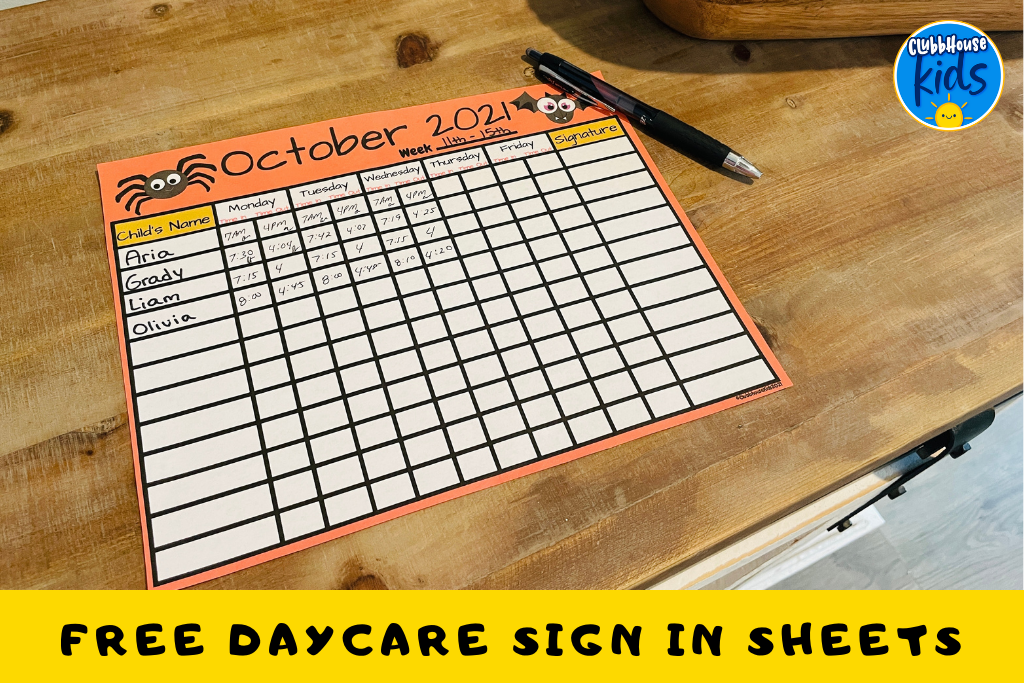
Teacher Calendar of Events
Another way to build parent communication is through a teacher calendar of events. Giving parents a picture into your classrooms helps them see all the benefits their child is getting from your program.
Window Into Your Classroom
Parents only see this small window of our day during pickup and drop-off times. If you’ve been a provider for a while, you know this isn’t always the best time of the day. They don’t get to see the children quietly reading on the reading rug, or intently focused on a lesson. The best way for them to get these glimpses is through a teacher calendar of events, such as a monthly calendar you send home, or a newsletter. These communication types invite them into your classroom.
Events and Fun Activities
I send home a monthly teacher calendar of events that states all the fun activities and themes we will be learning about in that particular month. This teacher calendar of events is also important to inform parents of any closings going on that month or even special family events in our area.
Learning Domains
The second thing I send home at the beginning of every month is a learning domain printable. This printable lays out all the classroom activities into the five domains of learning. This gives parents comfort in knowing my classroom is enhancing their child’s growth and development through play.
FREE Classroom Calendar
Would you like to add teacher calendar of events to your program? I offer a free calendar in my TPT store. Click here to get that free calendar printable. I update these calendars every summer as I plan for each new school year, so you can plan to have a refreshed calendar every year. My domains of learning outline can be found in each of my Toddler weekly lessons. If you aren’t following me on Teachers Pay Teachers, check out my store here.
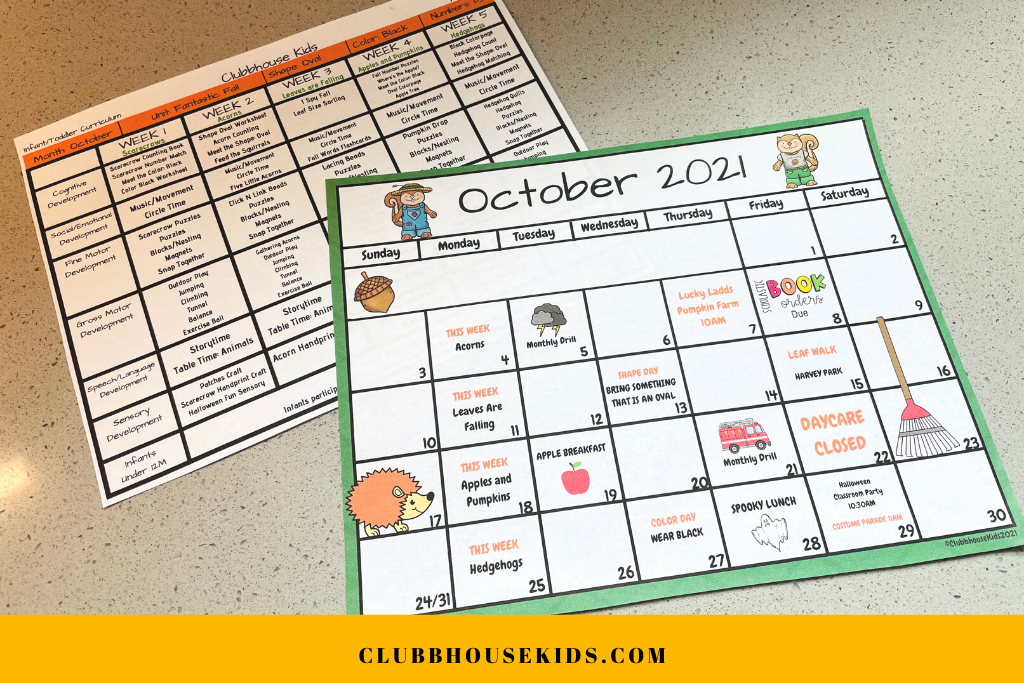
Parent Communication with Teachers
Let me know the communication types you utilize in your classroom and home daycare? I absolutely love sharing my ideas with other childcare providers. We can all learn from each other, let me know some parent communication with teachers you use in your classrooms or home daycares to get communication types open. I also love following other daycare providers, so please message me or add your blog below. Head on over to my Instagram to see more insights into my own home daycare and how I implement these strategies.

I just wanted to tell you that I appreciate you! Thank you for all the freebies and such great advice. I have not started my home childcare because my husband and I thought we would be moving to a different city. We still may. I work with Special needs students in high school but I have had my own registered home daycare before. I am very interested in to getting back into it. I have been keeping up with the trainings and started buying things for the daycare so it does not hit me all at once. As I said in the beginning I appreciate you. If I have any questions I would love to know I could reach out to you.
Sincerely,
Kathryn Guel
Thank you so much, your sweet comments mean a lot to me. You can always email me at hollie@clubbhousekids.com with any questions. I love talking with other providers and potential providers. If you are not on my email list, make sure to sign up. I send even more freebies and fun stuff exclusive to this group.
https://clubbhousekids.com/email-sign-up/